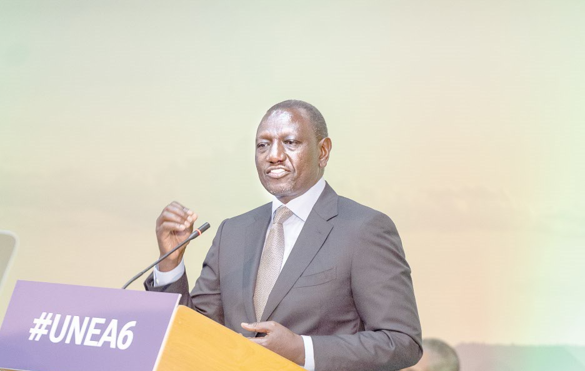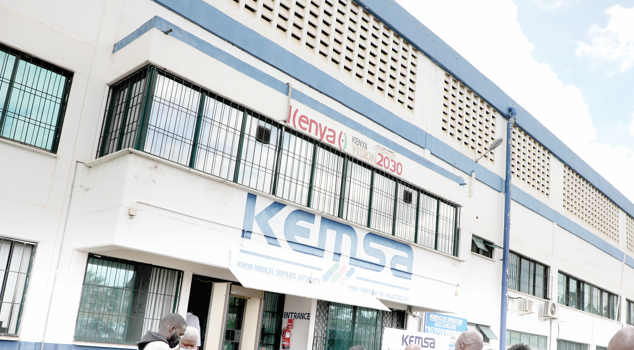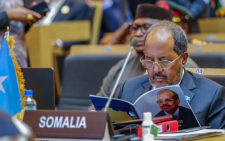Merge UN functions in Nairobi, Ruto appeals to world leaders

President William Ruto has called for consolidation of all United Nations Environment Programme (UNEP) functions in Nairobi’s Gigiri complex.
Ruto said this would be as per the United Nations Conference on Sustainable Development resolutions popularly known as Rio+20 held in Brazil, in June 2012. He said even as the fight against climate change intensifies, currently environmental governance across the globe remains disintegrated as the resolutions gather dust.
“This governance fragmentation leads to policy inconsistencies, overlaps, inefficiency, and wastage in the administration and implementation of Multilateral Environmental Agreements.
Addressing environmental issues in this manner diminishes efficiency and effectiveness, undermining our ability to make meaningful change,” the President said in his address to the delegates attending the high-level segment of the Sixth UN Environment Assembly (UNEA-6) in Gigiri Complex, Nairobi.
As the mandate of UNEP expands, the Head of State said finances allocated to the environmental agency from UN’s regular budget and voluntary funds are insufficient.
He urged the General Assembly to allocate the agency reliable funding from its regular budget to provide consistent and sustainable support for its work.
In the wake of the escalating climate change crisis, President Ruto faulted how multilateral institutions are currently constituted, warning that their systems are not up to the task of addressing the highly challenging circumstances for a transformative global cooperation.
“It is imperative for us to confront this truth with honesty, and rectify glaring deficiencies which impede effective multilateralism.
Our reform agenda must begin by attending to fundamental structural dimensions to re-align multilateral institutions with core values of the international community, including sovereign equality and effective democratic representation as the basis of enhanced effectiveness and inclusivity.”
President cited the plight of developing countries that are reeling in debt distress due to high-interest loans borrowed from multinational institutions and still suffering the most from the effects of climate which include floods, displacement of people, and prolonged drought.
“African countries, and many other developing countries, pay significantly higher costs – up to five times more than others – for our debt. Those seeking investments in private projects face high costs of capital driven by real and imaginary risks,” he said.
Urgent reform
“This arbitrary, unjust, discriminatory, and unequal state of affairs is untenable given the pressure of time, limited resources, and the imperative to actualise a fairer and more inclusive development and responsive global governance,” he added.
Ruto called for urgent reform of the global financial architecture to rectify its current deficiencies and modernisation of the entire system to meet the development needs of the majority in the 21st century.
With the UNEA-6 meeting happening three months after the 28th Conference of Parties (COP28) in Dubai, the President placed the responsibility of delivering its agenda on the shoulders of the delegates in Gigiri to underscore the power of international cooperation and multilateralism to curb climate change.
He, however, cautioned them that a daunting task awaits them since countries around the world are grappling with complex and dynamic challenges comprising interconnected and multifaceted threats, uncertainties, and shocks, ranging from sluggish economic growth, conflict and wars, and geopolitical fragmentation.
Adverse effects
“This situation is exacerbated by an alarming climate change trend whose implications are now impossible to ignore: Record-breaking temperatures, catastrophic droughts and floods, escalating sea levels, landslides, rampant wildfires and severe cyclones which have become frequent and familiar in many regions worldwide,” he added.
Additionally, Ruto hailed the gains attained from the COP28 including the operationalisation of the Loss and Damage Fund aimed to support economic and non-economic losses and damages associated with the adverse effects of climate change in climate-vulnerable developing nations.
The President also noted that the adoption of the Kunming-Montreal Global Biodiversity Framework was pivotal in defining the actions that must be undertaken within this decade to curb biodiversity loss by 2030 and set the planet on a path of restoration and recovery.












